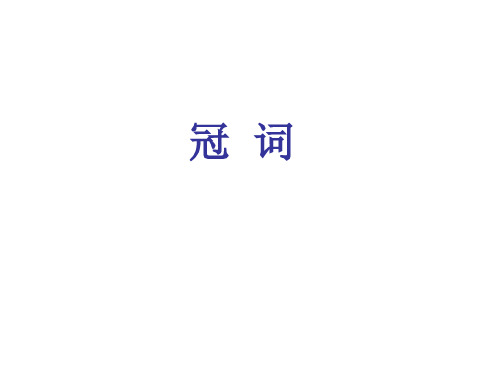小升初语法-冠词(讲义)通用版英语六年级下册
- 格式:docx
- 大小:18.33 KB
- 文档页数:9





冠词讲义冠词的用法:a 用在读音以辅音开头的单词前,表示“一个…” university student bookan用在读音以元音开头的单词前hour apple用”the” 的情况1.复述上文提到的任何事,被复述名词前用“the”。
There is a book in the desk. The book is mine.2.序数词前常用“the”。
I live on the second floor.3. 形容词的最高级前面要用the。
She is the most beautiful girl in the class.4.世界上独一无二的事物前面用the。
the sun,the moon,the sky5.演奏乐器时,乐器的名称前用the。
The man is playing the guitar.6.专有名词前面用the:the Great Wall,the Yellow River,the USA7.一些固定用法:in the morning/ afternoon/ evening不用冠词的场合1.单个的专有名词、抽象名词和物质名词前一般不用冠词,如China,Chinese,glass,water2.名词前面已有this,that,these, those, my, your, whose, some, any, no, each, every等,不再用冠词。
There isn’t any water in the bottle.I have no Chinese-English Dictionary.Every baby there is lovely.3.年份、季节、月份、星期前不用冠词Winter is coming.My father was born in 1905.4.复数名词表示一类人和事物时,不用冠词。
They are blue whales.5.三餐饭的前面不用冠词。

六年级下册英语-小升初英语冠词专题全国通用一、概述冠词是一种虚词,本身不能独立使用,只能置于名词前面,用来帮助说明该词的含义。
冠词有两种:不定冠词(a/an)定冠词(the)二、不定冠词的用法:1.不定冠词a/an与数词one都是“一个”的意思。
a用于辅音音素前,而an则用于元音音素前Eg: a pen 一支笔 a key 一把钥匙a ruler 一把尺子 a backpack 一个双肩背包a dictionary 一本字典an hour 一个小时an orange 一个橘子 a chair 一把椅子2.初次提到某人或某物,用来表类别—What is he? —He is a guide.—他是干什么的?—他是向导。
3.根据人或事物的整体,表示一类人或东西—An elephant is stronger than a horse.大象比马力气大。
(注意:不宜译为一头大象比一匹马力气大)4.表示“一”这个数量,意思和one差不多He will be back in a month or two.他一两个月后回来。
5.表示“某一个”,译成汉语时仍作“一个”解释A wang is looking for you outside.一位姓王的人在外面找您。
6.用于表示时间、速度、价格等意义的名词前,相当于every/per(每一)的意思We have a music class once a week .我们每周上一次音乐课。
7.使抽象内容具体化。
如:A great hope is a pleasure to us.伟大的理想造就伟人三、定冠词的用法:定冠词the与指示代词this ,that同源,有“那(这)个”的意思,但较弱,可以和一个名词连用,来表示某个或某些特定的人或事物。
1.特指双方都明白的人或物I want the book.我想要这本书。
2.上文提到过的人或事He has a pencil and the pencil is given by his sister.他有一支笔,这支笔是他姐姐给他的。
小学英语语法知识汇总
——冠词篇一、什么是冠词?
冠词是一种虚词。
不能独立使用,放在名词前,帮助说明名词所指的人或事物。
英语中的冠词分可分为两种:定冠词、不定冠词。
二、不定冠词
1.不定冠词的用法
a:用于辅音音素开头的单词前。
例:a cake 一块蛋糕 a tooth 一颗牙
an:用于元音音素开头的单词前。
例: an hour 一小时an umbrella 一把伞
词在不同子中表达的含义不同
(1)表示事物的数量为1
Can you give me a dictionary?
你能给我一本字典吗?
Tom had an egg and a glass of milk for breakfast.
汤姆早饭吃了一个鸡蛋和一杯牛奶。
(2)表示“每一”
Lisa goes to the park three times a week.
丽萨一周去公园三次。
This bag of pears costs five yuan a kilo.
这袋梨五元一公斤
(3)一类事物
A cat likes to eat fish. 猫喜欢吃鱼。
A lion can be dangerous. 狮子可能有危险性。
3不定冠词的固定用法
have a cold 感冒have a bath 洗澡as a result 结果 a lot of 许多
have a rest 休息have a try 尝试keep an eye on 照看 a kind of 一种
三、定冠词
定冠词the 有“这(那)个”的意思,可以和名词连用,表示某个或某些特定的人或东西。
Is the blue kite yours? 这个蓝色的风筝是你的吗?
The woman in pink is my aunt. 穿粉色衣服的女人是我的阿姨
I have a cat.The cat is black.
我有一只猫,它是黑色的。
I bought a dictionary. The dictionary is very useful.
我买了一本字典。
这本字典非常有用。
I went to the cinema last Sunday.
我上周日去了那家电影院。
What do you think of the show? 你觉得这场表演怎么样?
4.表示一家人,the 加上姓氏的复数形式
The Blacks live in Beijing. 布莱克一家住在北京。
5.用于形容词前,表示一类人
the old 老人the young 年轻人the sick 病人the rich 富人
the blind 盲人the poor 穷人
the world 世界the earth 地球the moon 月亮the sun 太阳
the Great Wall 长城the United States 美国the People's Square 人民广场
April is the fourth month of the year
四月是一年中的第四个月。
Our classroom is on the third floor.
我们的教室在三楼。
play the piano 弹钢琴play the guitar 弹吉他play the drum 打鼓
play the violin 小提琴
This city is one of the largest cities in the world.
这座城市是世界上最大城市之一。
She is the tallest girl in our team.
她是我们团队中最高的女生。
11.用于形容词only,same 之前,固定搭配
He is the only boy in his class.他是他们班唯一的男生。
12.用于江河、海洋、湖泊、群岛、山脉名之前
the West Lake 西湖the Huangpu River黄浦江the East Sea 东海the Himalayas 喜马拉雅山
at the moment 此刻in the afternoon 在下午
on the right 在右边on the other hand 在另一方面
in the end 最后all over the world 全世界
in the past 在过去in the future 在将来
四、不定冠词的情况
1.在星期、西方节日、月份以及季节等名词前
We like to swim in summer.我们喜欢在夏天游泳。
I'm going to the cinema on Saturday.我打算星期六去看电影
2.在语言、三餐、球/棋类运动等名词前
have lunch 吃午餐come to dinner 去吃饭play chess 下棋
play basketball 打篮球speak Chinese 说汉语
3.在人名、地名、国名、城市名、道名等专有名词前
Beijing is the capital of China.北京是中国的首都。
Dogs are human's friends狗是人类的朋友
5.在称呼、职位、头衔等名词前
Happy Mother's Day,Mum! 母亲节快乐,妈妈!
6.在不可数名词(物质名词和抽象名词) 前
We can't live without air. 没有空气我们不能活
Water is the source of life. 水是生命之源。
7.当名词前已有指示代词、物主代词及some,many 等修饰时There is some water in the bottle. 瓶里有一些水。
That's your hat,那是你的帽子。
8.在某些固定词组里的名词前
day and night 日日夜夜here and there 到处face to face 面对面hand in hand 手拉手go to school 去上学by underground 乘地铁on foot 步行at home 在家
冠词综合练习一、翻译下列词组。
10. 在十月
12. 看一看
13. 去自然公园的路
15. 在周六早上
二、选择填空
()1. My sister has black umbrella. I have orange umbrella.
A./; an
B. a; an
C. an: a
D. /; /
()2. The building in front of our school is hospital.
A. The D. /
()3. Look at kite. It flies high in sky.
A. the; the
B. a; an
C. the; an
D. /: the
()4. It's twelve o'clock. It's time for lunch.
A. the
B. /
()5. Shanghai is one of biggest cities in China.
A./; the
B. /: /
C. the: /
D. the; the
()6. My brother wants to be astronaut in the future.
B. /
C. the
D. an
()7. At Mid-Autumn Festival, we often eat mooncakes.
A. /
B. the
C. an
D. a
()8. It will take me hour to finish my homework.
A. the
B. an D. /
()9. water is very important to us.
A. The C./
()10. We have three meals day.
A.a
B. the
C.an
D./
三、用a,an,the,/填空。
1. My mother is teacher. She teaches Maths.
2. Look! sun and clouds are in the sky.
3. I have uniform(制服).
4. Which apple do you want, red one or green one?
5. Grace is good at playing football.
6. Smiths often have a barbecue on Sundays.
7. There is little juice in the bottle.
8. Ian and Lily are in same school.
9. Our Science teacher is old lady.
10. Where's supermarket?。